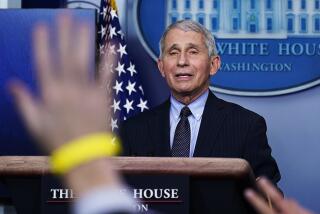Analysis: Science, politics face off in grudge match over Ebola rules
Confused by the ins and outs of how the governors of New York and New Jersey are coping with the Ebola crisis? Relax, there is an answer, but in this midterm election year, it appears that politics is trumping science.
As German social scientist Max Weber noted in speeches he gave almost 100 years ago, there is a difference between science and politics, each with a different language and goals.
Science, Weber argued, starts with the time-honored supposition that scientific truth exists. It is objective, eternal and not subject to human intervention. For example, 2+2=4 is true whether one is counting rocks or pencils, whether the counting is being done in the United States or in Africa, whether the counting is done this year or a century ago.
In politics, people search for truth in a universe where, unlike science, there rarely are answers in the back of the book. Political truth is often in the eyes of the beholder.
“Politics is a strong and slow boring of hard boards,” Weber said in his lecture to German students in Munich weeks after the horror of World War I ended. “It takes both passion and perspective. Certainly all historical experience confirms the truth -- that man would not have attained the possible unless time and again he had reached out for the impossible.”
“But to do that a man must be a leader, and not only a leader but a hero as well, in a very sober sense of the word,” Weber said.
Govs. Chris Christie of New Jersey and Andrew Cuomo of New York both acted to impose quarantine rules on healthcare workers when a Manhattan doctor tested positive after treating Ebola patients in West Africa. The doctor, Craig Spencer, had no symptoms when he traveled around the city, ate in a restaurant and went bowling in Brooklyn.
When he did develop a fever, Spencer contacted authorities and was rushed to Bellevue Hospital, where he remained in serious but stable condition Tuesday.
The science on the spread of Ebola is very clear in the medical world. The virus is spread through close contact with an infected person who has symptoms, such as a fever, or with the patient’s bodily fluids, such as blood. No symptoms, no danger.
Originally, New York and New Jersey issued strict quarantines for all healthcare workers returning from Ebola-stricken regions of West Africa.
But under pressure from the Obama administration and medical experts, Cuomo, a Democrat who is expected to easily win reelection, bowed to some of his own constituencies and revised the state policy. He allowed asymptomatic aid workers to return to their homes but remain in isolation.
The change opened up a slight bit of sunlight between the governors. But not enough to disinfect their Ebola policy, according to critics, mainly scientists and healthcare workers.
Christie, a Republican, and a leading GOP surrogate on the campaign trail in his capacity as head of the Republican Governors Assn., has stood firm. He insisted during a Monday appearance on NBC’s “Today” show that the Centers for Disease Control and Prevention would eventually come around to his harsher way of thinking about quarantine.
“The CDC has been behind on this. Folks got infected in Texas because they were behind,” Christie said of the two nurses who became infected in Dallas while treating Thomas Eric Duncan, the Liberian who died of Ebola in Texas. Both nurses have been treated and released. “We’re not going to have folks being infected in New Jersey and in other states in this country,” Christie insisted.
“Governors ultimately have the responsibility to protect the public health and the public safety of the people within their borders when folks come in with this problem,” he said, in effect arguing that the political necessity was higher on his agenda than the science.
Christie also cited five other states — Pennsylvania, Maryland, Virginia, New York and Georgia — where quarantine measures are in place, as well as reports that the Joint Chiefs of Staff recommended that the Pentagon impose a 21-day quarantine for troops returning from West Africa.
“This is common sense,” he said. “And the members of the American public believe it is common sense and we’re not moving an inch. Our policy hasn’t changed and our policy will not change.”
Federal officials have tried to reassure the American public, but with science. On television, doctors have repeatedly stressed the difficulty of spreading Ebola and the impossibility of spreading it unless the patient has symptoms.
Still, polls have consistently shown that the public remains fearful. Nearly two-thirds of Americans said they were concerned about a widespread Ebola epidemic in the United States, according to a Washington Post-ABC News poll about two weeks ago. Other polls have found similar fears.
Politicians have responded to those fears.
Polls show that Ebola is one of the factors, along with unrest in the Mideast and a fragile economy, that have made the American electorate uneasy. Pollsters have predicted that unhappiness could hurt incumbents.
Republican challenger Scott Brown recently played the Ebola card in a debate against Democratic incumbent Sen. Jeanne Shaheen of New Hampshire. Brown, like other Republicans in tight races across the country, attacked President Obama’s handling of the Ebola crisis as part of their ongoing complaints about poor Democratic leadership on a variety of issues.
Christie, a GOP contender in 2016, shrugs off complaints that he has bent science to his political needs.
Neither the images of nurse Kaci Hickox, held against her will in a tent outside a New Jersey hospital after she landed at Newark airport, nor the opinions of almost all healthcare experts that the governor had reached too far, has swayed Christie.
“I know she didn’t want to be there,” Christie said of Hickox, now home in Maine. “No matter what you do, there will be critics.”
Follow @latimesmuskal for national news
More to Read
Start your day right
Sign up for Essential California for news, features and recommendations from the L.A. Times and beyond in your inbox six days a week.
You may occasionally receive promotional content from the Los Angeles Times.







